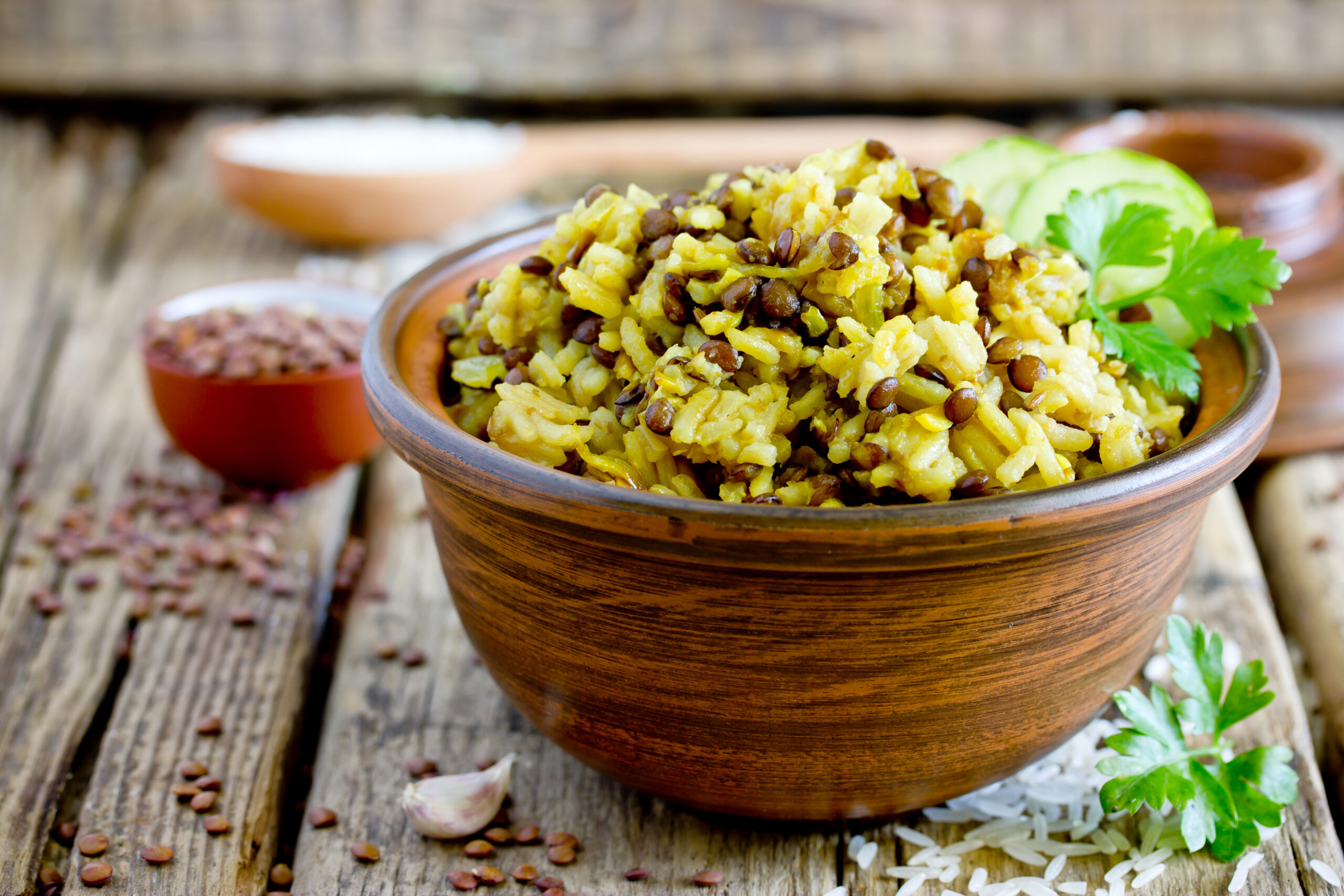
Kitchari is the most wonderful food in the world. You can eat it for breakfast, lunch and dinner. Eat it when you are sad, sick, depressed, or unhappy. Over the last few years it has become my go to meal and when my digestion plays up – it’s my comfort food. I know it will balance out any digestive problems, clear up my skin and just makes me feel good all over. If I have overdone it; traveled too much, stayed up too late, or eaten too much processed food, then a few days of kitchari will clear up any heaviness and sluggishness.
Kitchari is an Indian comfort food, and kitchari just means rice and beans. It’s a good source of nourishment when cleansing, or when our agni (digestive fire) is low and we want to eat something simple, nourishing and revitalizing.
Kitchari, made from basmati rice and mung beans is easily digestible. Plus the spices like fresh ginger, turmeric, fennel, cumin and coriander are all digestive spices which help make your metabolism efficient which in turn reduces digestive toxins. It’s digestive toxins that cause inflammation – inflammation causes disease!
Mung beans are sweet, cooling, light and dry. They balance Vata, Pitta and Kapha – thus their prolific use in Ayurveda cleanses. It is also a Sattvic food which means it helps calm and ground the central nervous system. Mung beans are the easiest bean to digest along with lentils so will not cause gas and bloating that some beans can do.
Mung beans and rice make a complete protein, providing essential amino acids. The ghee in kitchari calms the central nervous system and is a restorative in small amounts for all dosha, particularly Vata. The turmeric in the spices is a blood purifier and aids in the digestion of complete proteins. It reduces gas, and inflammation and is soothing. It also adds a lovely yellow color to the rice.
Mung beans are an alkaline food containing calcium, magnesium, potassium and sodium. A study by the Journal of Human and Experimental Toxicology shows that mung beans have the ability to reduce bad cholesterol levels and help regulate the level of cholesterol. The antioxidants of the beans eliminates free radicals, repairs the damage of blood vessels and reduce inflammation – good for Pittas who tend to high inflammation. Mung beans also have the ability to reduce high blood pressure which in turns reduces cardiovascular disease, great for Kaphas! A study published by the Chemistry Central Journal shows that extracts of mung bean lower the level of systolic blood pressure in rats. These small beans are a mighty cancer fighting agent with their polyphenols and oligosaccharides. Studies have shown these beans to have anti- tumor properties and enhance the immune system. The phytonutrients found act as an anti-inflammatory and anti-microbial substance which counteracts bacteria, colds, viruses, inflammation and rashes. Mung beans also possess high amounts of protein and fiber and studies show that high fiber beans increases cholecystokinin – the satiety hormone. That means mung beans as part of your diet can help lower your food intake, therefore increasing weight loss. So, Kaphas, these are the beans for you!
Lastly, mung beans contain a lot of vutamins; Vitamin K, B2, B9, B3, B5, B1 and B6 to be exact. As for minerals, mung beans contain significant amounts of copper, iron, manganese, zinc, phospherous, magnesium, potassium, calcium and sodium. They are also a good source of antioxidants such as selenium, Vitamin C, E, A and beta carotene.
Now you know why I eat these little beans almost daily. If you would like more healthy meals take a look at my recipe subscription program – I can’t wait to start cooking with you.
1/2-cup Organic whole green mung beans,
1/2 cup Organic brown basmati rice,
1/2 cup chopped or grated carrots,
1/2 cup chopped parsnips,
1 tsp chopped fresh ginger
Soak rice and beans overnight in water. Next morning pour off the water and rinse it with fresh water. Combine these together and cook in the rice cooker or a pan on the stove.
Heat the ghee in a second pan and add the garlic, sautéing it until it is golden-brown. Add cumin, coriander and other spices to taste. Add finely chopped spinach, basil and green onions.
Finally: Combine everything together, into the rice cooker. Add ½ tsp pink/Himalayan salt. ½ lemon or lime juice, freshly squeezed…
And enjoy!
There’s no one size fits all for what you should eat. If you would like to talk with me about what is the right diet for you, sign up for a complimentary consultation. Just click on the link to my online calendar to find a good time that works for you.

The Holistic HIghway integrates traditional Western medical practices with Ayurveda medicine, creating a focus on prevention through nutrition, diet, and exercise; use of the latest genetic testing and other diagnostic techniques; and prescribed combinations of botanical medicines, supplements, therapeutic diets, detoxification programs, or stress-management techniques.

Integrative Health Expert | Ayurveda Practitioner | Author | Speaker
Kerry is a globally recognized leader in integrative medicine and the science of health known as Ayurveda. She is passionate about raising awareness of the need for a change in contemporary medicine that focuses on patient empowerment and a health-based (rather than disease-based) medical system.
Kerry is connected with The University of Pittsburgh Center for Integrative Medicine and remains a pioneer in the field of integrative medicine where she has developed a personalized system to manage chronic disorders by incorporating fundamental changes in diet, behavior, and stress while focusing on genetics.
This individualized program is so successful that many of her clients have achieved maximum healing and vitality after years of chronic problems!
More to Explore